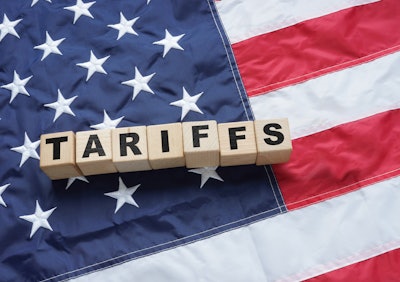
The United States–Mexico–Canada Agreement (USMCA), effective July 1, 2020, modernizes the North American Free Trade Agreement (NAFTA) by updating trade, labor, environmental, and digital commerce regulations. A key feature is that USMCA-compliant goods are exempt from U.S. tariffs, including those set for April 2.
Compliance hinges on a significant portion of a product's value coming from North American sources. Thus, companies relocating production to North America and using regional inputs can avoid U.S. import duties, with Mexico positioned to benefit strategically in the current trade environment, according to GlobalData’s Industry Insights: The impact of tariffs on consumer packaged goods report.
"Products manufactured in the U.S., Mexico, and Canada using materials sourced from North America are generally more likely to meet USMCA regulations and, as a result, may qualify for tariff exemptions. However, the situation becomes more intricate when raw materials are obtained from outside North America, known as 'non-originating' materials. To qualify as USMCA-compliant, these non-originating materials must not contribute more than 40% of the product's transaction value or more than 50% of the net cost of production, as outlined by the U.S. trade representative. Therefore, it is essential for companies to ensure that a significant portion of a product's value and costs is derived from materials and processes sourced within North America,” says Rory Gopsill, senior consumer analyst at GlobalData.
Key takeaways:
· The exemption of USMCA-compliant goods was confirmed by the United States when a raft of tariffs was announced in April. This is likely to have contributed to concerns about tariffs’ inflationary impact not increasing significantly among Mexican consumers and decreasing noticeably among Canadian consumers between Q1 and Q2, according to GlobalData’s Q1 and Q2 2025 surveys. This reflects the positives that the exemption of USMCA-compliant goods could yield for the Canadian and Mexican economies.
· This situation presents two strategic opportunities for consumer goods and packaging companies. The first opportunity involves reshoring manufacturing operations to North America, with Mexico positioned as the primary beneficiary of this trend. Among the three North American countries, Mexico offers the lowest labor costs, making it an attractive manufacturing hub.
· Additionally, foreign direct investment in Mexico saw a 5% increase in the first quarter of 2025 compared to the same period in 2024, with new investments contributing 7.4%, up from 3% in the previous year, according to Mexico Daily News. This indicates a growing trend of both new investments and the reinvestment of profits in Mexico, despite the presence of tariffs, suggesting that Mexican manufacturing remains a viable option.
· The second opportunity involves reformulating and adjusting supply chains to maximize the use of materials sourced within North America. For instance, a paperboard manufacturer may consider transitioning from pulp sourced in Asia to Canadian wood pulp, thereby ensuring that the packaging component is sourced from Canada. This strategic shift enhances the likelihood of the packaged product being compliant with USMCA regulations, thus qualifying for tariff exemptions. Similarly, a food and beverage company could opt for Canadian wood-fiber lids or board for their cartons. By utilizing North American raw materials in this manner, consumer goods companies can improve their chances of adhering to rules of origin, thereby reducing import costs and simplifying supply chain compliance for their finished products.
“Companies should observe that these strategic shifts would not necessarily deliver on the U.S.’ aim of revitalizing its domestic manufacturing sector (since the USMCA could result in manufacturing being reshored to Mexico, not the U.S.). This could result in the Trump Administration rethinking tariff exemptions for USMCA-compliant goods,” says Gopsill. “The USMCA is scheduled for review and potential renegotiation in 2026, and edits currently under discussion include modifications to automotive industry rules of origin and restrictions on Chinese companies in North America. Consumer goods and packaging companies should monitor how these talks progress closely to minimize risk when adjusting North American supply chain.”




















